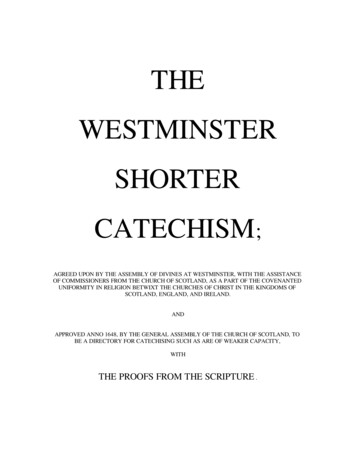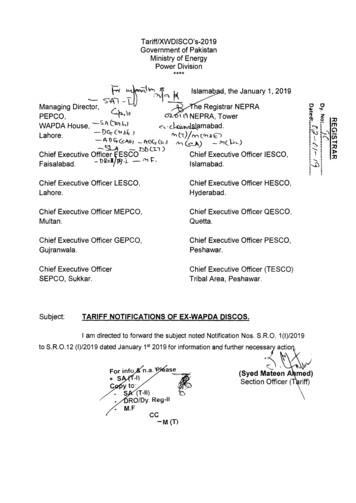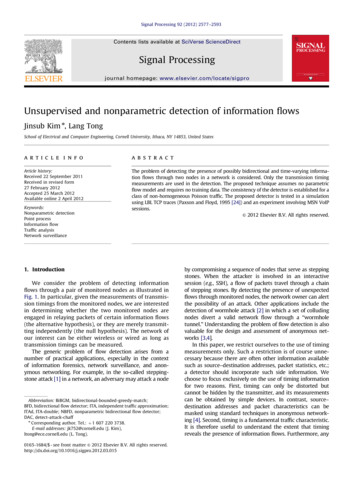
Transcription
http://www.biblesnet.comMan's Chief End is to Glorify Godby Thomas WatsonEdited by George RogersQuestion. 1. What is the chief end of man?Answer. Man's chief end is to glorify God, and to enjoy him for ever.Here are two ends of life specified. 1. The glorifying of God. 2. The enjoying ofGod.First. The glorifying of God, 1 Pet. 4:11. "That God in all things may be glorified."The glory of God is a silver thread which must run through all our actions. l Cor.10:31. "Whether therefore ye eat or drink, or whatsoever ye do, do all to theglory of God." Everything works to some end in things natural and artificial; now,man being a rational creature, must propose some end to himself, and thatshould be, that he may lift up God in the world. He had better lose his life thanthe end of his living. The great truth asserted is that the end of every man'sliving should be to glorify God. Glorifying God has respect to all the persons inthe Trinity; it respects God the Father who gave us life; God the Son, who losthis life for us; and God the Holy Ghost, who produces a new life in us; we mustbring glory to the whole Trinity.When we speak of God's glory, the question will be moved, What are tounderstand by God's glory?Answer. There is a twofold glory: 1. The glory that God has in himself, hisintrinsic glory. Glory is essential to the Godhead, as light is to the sun: he iscalled the "God of glory." Acts 7:2. Glory is the sparkling of the Deity; it is so conatural to the Godhead, that God cannot be God without it. The creature'shonour is not essential to his being. A king is a man without his regal ornaments,when his crown and royal robes are taken away; but God's glory is such anessential part of his being, that he cannot be God without it. God's very life liesin his glory. This glory can receive no addition, because it is infinite; it is thatwhich God is most tender of, and which he will not part with. Isa. 48:11, "Myglory I will not give to another." God will give temporal blessings to his children,
http://www.biblesnet.comsuch as wisdom, riches, honour; he will give them spiritual blessings, he will givethem grace, he will give them his love, he will give them heaven; but hisessential glory he will not give to another. King Pharaoh parted with a ring off hisfinger to Joseph, and a gold chain, but he would not part with his throne. Gen.41:40. "Only in the throne will I be greater than thou." So God will do much forhis people; he will give them the inheritance; he will put some of Christ's glory,as mediator upon them; but his essential glory he will not part with; "in thethrone he will be greater."2. The glory which is ascribed to God, or which his creatures labour to bring tohim. 1 Chron. 16:29, "Give unto the Lord the glory due unto his name." And, 1Cor. 6:20, "Glorify God in your body, and in your spirit." The glory we give God isnothing else but our lifting up his name in the world, and magnifying him in theeyes of others. Phil. 1:20, "Christ shall be magnified in my body."Q. What is it to glorify God?A. Glorifying God consists in four things: 1. Appreciation, 2. Adoration, 3.Affection, 4. Subjection. This is the yearly rent we pay to the crown of heaven.1. Appreciation. To glorify God is to set God highest in our thoughts, and, tohave a venerable esteem of him. Psalm 92:8. "Thou, Lord, art most high forevermore." Psalm 97:9, "Thou art exalted far above all gods." There is in God allthat may draw forth both wonder and delight; there is a constellation of allbeauties; he is prima causa [the first cause], the original and spring-head ofbeing, who sheds a glory upon the creature. We glorify God when we are Godadmirers; admire his attributes, which are the glistening beams by which thedivine nature shines forth; his promises which are the charter of free grace, andthe spiritual cabinet where the pearl of price is hid; the noble effects of hispower and wisdom in making the world, which is called "the work of his fingers."Psalm 8:3. To glorify God is to have God-admiring thoughts; to esteem him mostexcellent, and search for diamonds in this rock only.2. Glorifying God consists in adoration, or worship. Psalm 29:2. "Give unto theLord the glory due unto his name; worship the Lord in the beauty of holiness."There is a twofold worship: 1. A civil reverence which we give to persons ofhonour. Gen. 23:7, "Abraham stood up and bowed himself to the children ofHeth." Piety is no enemy to courtesy. 2. A divine worship which we give to Godas his royal prerogative. Neh. 8:6,"they bowed their heads, and worshipped theLord with their faces towards the ground." This divine worship God is veryjealous of; it is the apple of his eye, the pearl of his crown; which he guards, ashe did the tree of life, with cherubims and a flaming sword, that no man may
http://www.biblesnet.comcome near it to violate it. Divine worship must be such as God himself hasappointed, otherwise it is offering strange fire, Lev. 10:1. The Lord would haveMoses make the tabernacle, "according to the pattern in the mount." Exod.25:40. He must not leave out anything in the pattern, nor add to it. If God wasso exact and curious about the place of worship, how exact will he be about thematter of his worship! Surely here every thing must be according to the patternprescribed in his word.3. Affection. This is part of the glory we give to God, who counts himself glorifiedwhen he is loved. Deut. 6:5, "Thou shalt love the Lord thy God with all thy heart,and with all thy soul." There is a twofold love: 1. Amor concupiscentiae, a love ofconcupiscence, which is self-love; as when we love another because he does usa good turn. A wicked man may be said to love God, because he has given him agood harvest, or filled his cup with wine. This is rather to love God's blessingthan to love God. 2. Amor amicitiae, a love of delight, as a man takes delight in afriend. This is to love God indeed; the heart is set upon God, as a man's heart isset upon his treasure. This love is exuberant, not a few drops, but a stream. It issuperlative; we give God the best of our love, the cream of it. Cant. 8:2,"I wouldcause thee to drink of spiced wine of the juice of my pomegranate." If thespouse had a cup more juicy and spiced, Christ must drink of it. It is intense andardent. True saints are seraphims, burning in holy love to God [from the Hebrewword saruph, to be burned up]. The spouse was amore perculsa, [anoverwhelming love], in fainting fits, "sick of love," Cant. 2:5. Thus to love God isto glorify him. He who is the chief of our happiness has the chief of ouraffections.4. Subjection. This is when we dedicate ourselves to God, and stand readydressed for his service. Thus the angels in heaven glorify him; they wait on histhrone, and are ready to take a commission from him; therefore they arerepresented by the cherubims with wings displayed, to show how swift they arein their obedience. We glorify God when we are devoted to his service; our headstudies for him, our tongue pleads for him, and our hands relieve his members.The wise men that came to Christ did not only bow the knee to him, butpresented him with gold and myrrh. Matt. 2:11. So we must not only bow theknee, give God worship, but bring presents of golden obedience. We glorify Godwhen we falter at no service, when we fight under the banner of his gospelagainst an enemy, and say to him as David to King Saul, "Thy servant will go andfight with this Philistine," 1 Sam. 17:32.A good Christian is like the sun, which not only sends forth heat, but goes itscircuit round the world. Thus, he who glorifies God has not only his affectionsheated with love to God, but he goes his circuit too; he moves vigorously in thesphere of obedience.
http://www.biblesnet.comQ. Why must we glorify God?A. 1. Because he gives us our being. Psalm 100:3, "It is he that made us." Wethink it a great kindness in a man to spare our life, but what kindness is it in Godto give us our life! We draw our breath from him; and as life, so all the comfortsof life are from him. He gives us health, which is the sauce to sweeten our life;and food, which is the oil that nourishes the lamp of life. If all we receive is fromhis bounty, is it not reasonable we should glorify him? Should we not live to him,seeing we live by him? Rom. 11:36, "For of him, and through him, are all things."All we have is of his fulness, all we have is through his free grace; and thereforeto him should be all. It follows, therefore, "To him be glory for ever." God is notour benefactor only, but our founder, as rivers that come from the sea emptytheir silver streams into the sea again.2. Because God has made all things for his own glory. Prov. 16:4. "The Lord hathmade all things for himself:" that is, "for his glory." As a king has excise out ofcommodities, so God will have glory out of everything. He will have glory out ofthe wicked. If they will not give him glory, he will get glory upon them. Exod.14:17. "I will get me honour upon Pharaoh." But especially has he made thegodly for his glory; they are the lively organs of his praise. Isa. 43:21, "Thispeople have I formed for myself, and they shall shew forth my praise." It is true,they cannot add to his glory, but they may exalt it; they cannot raise him inheaven, but they may raise him in the esteem of others here. God has adoptedthe saints into his family, and made them a royal priesthood, that they shouldshow forth the praise of him who hath called them, I Pet. 2:9.3. Because the glory of God has intrinsic value and excellence; it transcends thethoughts of men, and the tongues of angels. His glory is his treasure, all hisriches lie here; as Micah said. Judges 18:24, "What have I more?" So, what hasGod more? God's glory is worth more than heaven, and worth more than thesalvation of all men's souls. Better kingdoms be thrown down, better men andangels be annihilated, than God should lose one jewel of his crown, one beam ofhis glory.4. Creatures below us, and above us, bring glory to God; and do we think to sitrent free? Shall everything glorify God but man? It would be a pity then that manwas ever made. (1.) Creatures below us glorify God, the inanimate creatures andthe heavens glorify God. "The heavens declare the glory of God." Psalm 19:1.The curious workmanship of heaven sets forth the glory of its Maker; thefirmament is beautified and pencilled out in blue and azure colours, where thepower and wisdom of God may be clearly seen. "The heavens declare his glory:"we may see the glory of God blazing in the sun, and twinkling in the stars. Look
http://www.biblesnet.cominto the air, the birds, with their chirping music, sing hymns of praise to God.Every beast in its kind glorifies God. Isa. 43:20, "The beasts of the field shallhonour me." (2.) Creatures above us glorify God: "the angels are ministeringspirits." Heb. 1:14. They are still waiting on God's throne, and bring somerevenues of glory into the exchequer of heaven. Surely man should be muchmore studious of God's glory than the angels; for God has honoured him morethan the angels, in that Christ took man's nature upon him, and not the angels.Though, in regard of creation, God made man "a little lower than the angels,"Heb. 2:7, yet, in regard of redemption, God has set him higher than the angels.He has married mankind to himself; the angels are Christ's friends, not hisspouse. He has covered us with the purple robe of righteousness, which is abetter righteousness than the angels have, 2 Cor. 5:20. If then the angels bringglory to God, much more should we, being dignified with honour above angelicspirits.5. We must bring glory to God, because all our hopes hang upon him. Psalm39:7. "My hope is in thee." And Psalm 62:5. "My expectation is from him;" Iexpect a kingdom from him. A child that is good-natured will honour his parent,by expecting all he needs from him. Psalm 87:7. "All my springs are in thee." Thesilver springs of grace, and the golden springs of glory are in him.Q. In how many ways may we glorify God?Answer. 1. It is glorifying God when we aim purely at his glory. It is one thing toadvance God's glory, another thing to aim at it. God must be the Terminus adquem, the ultimate end of all actions. Thus Christ, John 8:50, "I seek not mineown glory, but the glory of him that sent me." A hypocrite has a crooked eye, forhe looks more to his own glory than God's. Our Saviour deciphers such, andgives a caveat against them in Matthew 6:2, "when thou givest alms, do notsound a trumpet." A stranger would ask, "What means the noise of thistrumpet?" It was answered, "They are going to give to the poor." And so theydid not give alms, but sold them for honour and applause, that they might haveglory of men; the breath of men was the wind that blew the sails of their charity;"verily they have their reward." The hypocrite may make his acquittance andwrite, "received in full payment." Chrysostom calls vainglory one of the devil'sgreat nets to catch men. And Cyprian says, "whom Satan cannot prevail againstby intemperance, those he prevails against by pride and vainglory." Oh let ustake heed of self-worshipping! Aim purely at God's glory.Q. How shall we know when we aim at God's glory?
http://www.biblesnet.comA. (1.) When we prefer God's glory above all other things; above credit, estate,relations; when the glory of God coming in competition with them, we prefer hisglory before them. If relations lie in our way to heaven, we must either leap overthem, or tread upon them. A child must unchild himself, and forget he is a child;he must know neither father nor mother in God's cause. Deut. 33:9, "Who saidunto his father and mother, I have not seen him; neither did he acknowledge hisbrethren." This is to aim at God's glory.(2.) We aim at God's glory, when we are content that God's will should takeplace, though it may cross ours. Lord, I am content to be a loser, if thou be againer; to have less health, if I have more grace, and thou more glory. Let it befood or bitter medicine if thou gives it me. Lord, I desire that which may be mostfor thy glory. Our blessed Saviour said, "not as I will, but as thou wilt." Matt.26:39. If God might have more glory by his sufferings, he was content to suffer.John 12:28, "Father, glorify thy name."(3.) We aim at God's glory when we are content to be outshined by others ingifts and esteem, so that his glory may be increased. A man that has God in hisheart, and God's glory in his eye, desires that God should be exalted. If this beeffected, no matter whom the instrument, he rejoices. Phil. 1:15, "Some preachChrist of envy: notwithstanding Christ is preached, and I therein do rejoice, yea,and will rejoice;" they preached Christ of envy, they envied Paul that concourseof people, and they preached that they might outshine him in gifts, and get awaysome of his hearers: well, says Paul, Christ is preached, and God is like to havethe glory, therefore I rejoice; let my candle go out, if the Sun of Righteousnessmay but shine.2. We glorify God by a frank confession of sin. The thief on the cross haddishonoured God in his life, but at his death he brought glory to God byconfession of sin. Luke 23:41, "We indeed suffer justly." He acknowledged hedeserved not only crucifixion, but damnation. Josh. 7:19, "My son, give, I, praythee, glory to God, and make confession unto him." A humble confession exaltsGod. How is God's free grace magnified in crowning those who deserve to becondemned! The excusing and mincing of sin casts a reproach upon God. Adamdenied not that he tasted the forbidden fruit, but, instead of a full confession, hetaxed God. Gen. 3:12. "The woman whom thou gavest me, she gave me of thetree, and I did eat;" if thou had not given me the woman to be a tempter, Iwould not have sinned. Confession glorifies God, because it clears him; itacknowledges that he is holy and righteous, whatever he does. Nehemiahvindicates God's righteousness; chap. 9:33. "Thou art just in all that is broughtupon us." A confession is frank when it is free, not forced. Luke 15:18. "I havesinned against heaven and before thee." The prodigal charged himself with sinbefore his Father charged him with it.
http://www.biblesnet.com3. We glorify God by believing. Rom. 4:20. "Abraham was strong in faith, givingglory to God." Unbelief affronts God, it gives him the lie; "he that believeth not,maketh God a liar." I John 5:10. But faith brings glory to God; it sets to its sealthat God is true. John 3:33. He that believes flies to God's mercy and truth, as toan altar of refuge, he engarrisons himself in the promises, and trusts all he haswith God. Psalm 31:5, "Into thy hands I commit my spirit." This is a great way ofbringing glory to God, and God honours faith because faith honours him. It is agreat honour we do to a man when we trust him with all we have, when we putour lives and estates into his hand; it is a sign we have a good opinion of him.The three children glorified God by believing. "The God whom we serve is able todeliver us, and will deliver us," Dan. 3:17. Faith knows there are noimpossibilities with God, and will trust him where it cannot see him.4. We glorify God, by being tender of his glory. God's glory is dear to him as theapple of his eye. An innocent child weeps to see a disgrace done to his father.Psalm 69:9, "The reproaches of them that reproached thee are fallen upon me."When we hear God reproached, it is as if we were reproached; when God's glorysuffers, it is as if we suffered. This is to be tender of God's glory.5. We glorify God by fruitfulness. John 15:8. "Hereby is my Father glorified, thatye bear much fruit." As it is dishonouring God to be barren, so fruitfulnesshonours him. Phil. 1:11. "Filled with the fruits of righteousness, which are to thepraise of his glory." We must not be like the fig tree in the gospel, which hadnothing but leaves, but like the pomecitron, that is continually either mellowingor blossoming, and is never without fruit. It is not profession, but fruit thatglorifies God. God expects to have his glory from us in this way. 1 Cor. 9:7, "Whoplanteth a vineyard, and eateth not of the fruit of it?" Trees in the forest may bebarren, but trees in the garden are fruitful. We must bring forth the fruits of loveand good works. Matt. 5:16."Let your light so shine before men, that they maysee your good works, and glorify your Father which is in heaven." Faith sanctifiesour works, and works testify our faith; to be doing good to others, to be eyes tothe blind, feet to the lame, much glorifies God. Thus Christ glorified his Father;"he went about doing good." Acts 10:38. By being fruitful, we are fair in God'seyes. Jer. 11:16. "The Lord called thy name a green olive-tree, fair and of goodlyfruit." And we must bear much fruit; it is muchness of fruit that glorifies God: "ifye bear much fruit." The spouse's breasts are compared to clusters of grapes, toshow how fertile she was, Cant. 7:7. Though the lowest degree of grace maybring salvation to you, yet it will not bring much glory to God. It was not a sparkof love Christ commended in Mary, but much love; "she loved much," Luke 7:47.6. We glorify God by being contented in that state in which Providence hasplaced us. We give God the glory of his wisdom, when we rest satisfied withwhat he carves out to us. Thus Paul glorified God. The Lord cast him into asgreat variety of conditions as any man, "in prisons more frequent, in deaths oft,"
http://www.biblesnet.com2 Cor. 11:23, yet he had learned to be content. Paul could sail either in a stormor a calm; he could be anything that God would have him; he could either wantor abound, Phil. 4:13. A good Christian argues thus: It is God that has put me inthis condition; he could have raised me higher, if he pleased, but that mighthave been a snare to me: he has done it in wisdom and love; therefore I will sitdown satisfied with my condition. Surely this glorifies God much; God countshimself much honoured by such a Christian. Here says God, is one after mineown heart; let me do what I will with him, I hear no murmuring, he is content.This shows abundance of grace. When grace is crowning, it is not so much to becontent; but when grace is conflicting with inconveniences, then to be content isa glorious thing indeed. For one to be content when he is in heaven is nowonder; but to be content under the cross is like a Christian. This man mustneeds bring glory to God; for he shows to all the world, that though he has littlemeal in his barrel, yet he has enough in God to make him content: he says, asDavid, Psalm 16:5, "The Lord is the portion of mine inheritance; the lines arefallen to me in pleasant places."7. We glorify God by working out our own salvation. God has bound together hisglory and our good. We glorify him by promoting our own salvation. It is a gloryto God to have multitudes of converts; now, his design of free grace takes, andGod has the glory of his mercy; so that, while we are endeavouring oursalvation, we are honouring God. What an encouragement is this to the serviceof God to think, while I am hearing and praying, I am glorifying God; while I amfurthering my own glory in heaven, I am increasing God's glory. Would it not bean encouragement to a subject, to hear his prince say to him, You will honourand please me very much, if you will go to yonder mine of gold, and dig as muchgold for yourself as you can carry away? So, for God to say, Go to theordinances, get as much grace as you can, dig out as much salvation as you can;and the more happiness you have, the more I shall count myself glorified.8. We glorify God by living to God 2 Cor. 5:15, "That they which live should notlive to themselves, but unto him who died for them." Rom. 14:8, "Whether welive, we live unto the Lord." The Mammonist lives to his money, the Epicure livesto his belly; the design of a sinner's life is to gratify lust, but we glorify God whenwe live to God.Q. What is it to live to God?A. When we live to his service, and lay ourselves out wholly for God. The Lordhas sent us into the world, as a merchant sends his agent beyond the seas totrade for him. We live to God when we trade for his interest, and propagate hisgospel. God has given every man a talent; and when a man does not hide it in a
http://www.biblesnet.comnapkin, but improves it for God, he lives to God. When a master in a family, bycounsel and good example, labours to bring his servants to Christ; when aminister spends himself, and is spent, that he may win souls to Christ, and makethe crown flourish upon Christ's head; when the magistrate does not wear thesword in vain, but labours to cut down sin, and to suppress vice; this is to live toGod, and this is glorifying God. Phil. 1:20. "That Christ might be magnified,whether by life or by death." Three wishes Paul had, and they were all aboutChrist; that he might be found in Christ, be with Christ, and magnify Christ.9. We glorify God by walking cheerfully. It brings glory to God, when the worldsees a Christian has that within him that which can make him cheerful in theworst times; that can enable him, with the nightingale, to sing with a thorn at hisbreast. The people of God have ground for cheerfulness. They are justified andadopted, and this creates inward peace; it makes music within, whatever stormsare without, 2 Cor. 1:4. I Thess. 1:6. If we consider what Christ has wrought forus by his blood, and wrought in us by his Spirit, it is a ground of greatcheerfulness, and this cheerfulness glorifies God. It reflects upon a master whenthe servant is always drooping and sad; sure he is kept to hard commons, hismaster does not give him what is fitting; so, when God's people hang theirheads, it looks as if they did not serve a good master, or repented of theirchoice, which reflects dishonour on God. As the gross sins of the wicked bring ascandal on the gospel, so do the uncheerful lives of the godly. Psalm 100:2,"Serve the Lord with gladness." Your serving him does not glorify him, unless itbe with gladness. A Christian's cheerful looks glorify God; religion does not takeaway our joy, but refines it; it does not break our viol, but tunes it, and makesthe music sweeter.10. We glorify God by standing up for his truths. Much of God's glory lies in histruth. God has entrusted us with his truth, as a master entrusts his servant withhis purse to keep. We have not a richer jewel to trust God with than our souls,nor has God a richer jewel to trust us with than his truth. Truth is a beam thatshines from God. Much of his glory lies in his truth. When we are advocates fortruth we glorify God. Jude 3, "That ye should contend earnestly for the truth."The Greek word to contend signifies great contending, as one would contend forhis land, and not suffer his right to be taken from him, so we should contend forthe truth. Were there more of this holy contention God would have more glory.Some contend earnestly for trifles and ceremonies, but not for the truth. Weshould Count him indiscreet that would contend more for a picture than for hisinheritance; for a box of toys than for his box of title deeds.11. We glorify God by praising him. Doxology, or praise, is a God-exalting work.Psalm 50:23, "Whoso offereth praise glorifieth me." The Hebrew word Bara, tocreate, and Barak, to praise, are little different, because the end of creation is topraise God. David was called the sweet singer of Israel, and his praising God was
http://www.biblesnet.comcalled glorifying God. Psalm 96:12. "I will praise thee, O Lord my God, and I willglorify thy name." Though nothing can add to God's essential glory, yet praiseexalts him in the eyes of others. When we praise God, we spread his fame andrenown, we display the trophies of his excellency. In this manner the angelsglorify him; they are the choristers of heaven, and do trumpet forth his praise.Praising God is one of the highest and purest acts of religion. In prayer we actlike men; in praise we act like angels. Believers are called "temples of God." ICor. 3:16. When our tongues praise, then the organs in God's spiritual templeare sounding. How sad it is that God has no more glory from us in this way!Many are full of murmuring and discontent, but seldom bring glory to God, bygiving him the praise due to his name. We read of the saints having harps intheir hands, the emblems of praise. Many have tears in their eyes, andcomplaints in their mouths, but few have harps in their hands, blessing andglorifying God. Let us honour God this way. Praise is the quit-rent we pay toGod: as long as God renews our lease, we must renew our rent.12. We glorify God, by being zealous for his name. Num. 25:11, "Phineas hathturned my wrath away, while he was zealous for my sake." Zeal is a mixedaffection, a compound of love and anger; it carries forth our love to God, and ouranger against sin in an intense degree. Zeal is impatient of God's dishonour; aChristian fired with zeal takes a dishonour done to God worse than an injurydone to himself. Rev. 2:2, "Thou canst not bear them that are evil." Our SaviourChrist thus glorified his Father; he, being baptized with a spirit of zeal, drove themoney-changers out of the temple, John 2:14-17. "The zeal of thine house hatheaten me up."13. We glorify God, when we have an eye to God in our natural and in our civilactions. In our natural actions; in eating and drinking. 1 Cor. 10:31 "Whethertherefore ye eat or drink, do all to the glory of God." A gracious person holds thegolden bridle of temperance; he takes his meat as a medicine to heal the decaysof nature, that he may be the fitter, by the strength he receives, for the serviceof God; he makes his food, not fuel for lust, but help to duty. In buying andselling, we do all to the glory of God. The wicked live upon unjust gain, byfalsifying the balances, as in Hosea 12:7, "The balances of deceit are in hishands;" and thus while men make their weights lighter, they make their sinsheavier, when by exacting more than the commodity is worth, they do not foreighty write down fifty, but for fifty eighty; when they exact double the price thata thing is worth. We buy and sell to the glory of God, when we observe thatgolden maxim, "To do to others as we would have them do to us;" so that whenwe sell our commodities, we do not sell our consciences also. Acts 24:16. "Hereindo I exercise myself, to have always a conscience void of offence towards God,and towards men." We glorify God, when we have an eye to God in all our civiland natural actions, and do nothing that may reflect any blemish on religion.
http://www.biblesnet.com14. We glorify God by labouring to draw others to God; by seeking to convertothers, and so make them instruments of glorifying God. We should be bothdiamonds and loadstones (magnetic rocks); diamonds for the lustre of grace andloadstones for attractive virtue in drawing others to Christ. Gal. 4:19, "My littlechildren, of whom I travail," etc. It is a great way of glorifying God, when webreak open the devil's prison, and turn men from the power of Satan to God.15. We glorify God in a high degree when we suffer for God, and seal the gospelwith our blood. John 21:18,19, "When thou shalt be old, another shall gird thee,and carry thee, whither thou wouldest not: this spake he, signifying by whatdeath he should glorify God." God's glory shines in the ashes of his martyrs. Isa.24:15, "wherefore glorify the Lord in the fires." Micah was in the prison, Isaiahwas sawn asunder, Paul beheaded, Luke hanged on an olive tree; thus did they,by their death, glorify God. The sufferings of the primitive saints did honour toGod, and made the gospel famous in the world. What would others say? Seewhat a good master they serve, and how they love him, that they will venturethe loss of all in his service. The glory of Christ's kingdom does not stand inworldly pomp and grandeur, as other kings; but it is seen in the cheerfulsufferings of his peo
a good turn. A wicked man may be said to love God, because he has given him a good harvest, or filled his cup with wine. This is rather to love God's blessing than to love God. 2. Amor amicitiae, a love of delight, as a man takes delight in a friend. This is to love God indeed; the heart is set upon God, as










